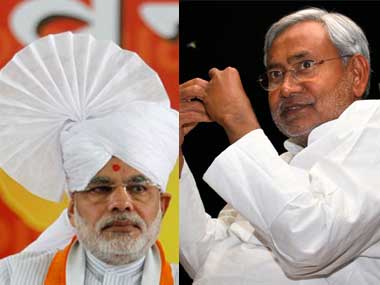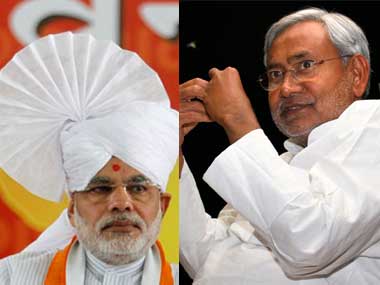The next election is the NDA’s to lose. Barring a dramatic turnaround in the UPA’s quality of governance and delivery on the economic front (inflation, growth), a clear anti-incumbency mood is steadily building up in the country – as the
two recent polls
(one by CNN-IBN and another by Headlines Today) show. The problem – but it could even be a solution – is that it now has two potential Prime Ministers who are inimical to one another: Narendra Modi and Nitish Kumar of Bihar. Recent
statements
by members of the Janata Dal (United) suggest that Nitish Kumar is not going to accept Modi’s leadership of the NDA, if it ever comes to that. While one of them , Pramod Mishra of Jharkhand, has said Nitish’s economic achievements in Bihar were better than Modi’s in Gujarat, the party’s Rajya Sabha leader, Shivanand Tiwari, blasted Modi and called his prime ministerial aspirations a “day-dream.” “The wisdom of the people of the country of over 120 crore people is not so weak as to hand over the mantle of national leadership to a person who had failed to deliver justice and perform raj dharma to over 5 crore people (of Gujarat),” Tiwari is reported to have said. Meanwhile, two criticisms of the Modi fast have rapidly surfaced – both in the media and among commentators. One is the fact that beyond mere token phrases hinting at regret over the communal carnage of 2002, Modi showed no real signs of contrition. Neither his body language nor his words conveyed any indication of a genuine effort to seek closure with the victims of 2002. However, this is missing the wood for trees. The critics are wrong for three reasons. One, Modi has to play two games: one is the build up for the Gujarat assembly election next year, which he must win well at any cost, and the other is his positioning as a national leader. This is what may be preventing him from a clear mea culpa on 2002. His image in Gujarat is that of a Hindu strongman who delivered growth and governance. When critics attack him, Gujaratis feel more inclined to vote for him. A premature commiseration with Muslims will weaken him in the eyes of the right wing of his own party and the Sangh parivar. This is one reason why he declined to wear a Muslim cap when one was offered to him when he wore every other community’s shawls and headgear without murmur. Two, the fast was more pre-emptive in nature to tell his challengers inside BJP that his hat is in the ring. Consider the choice of the fast as a vehicle to announce his reinvention. Modi is the macho political hero, not your self-effacing politician wallowing in humility. So why would he choose a fast except to make a veiled announcement? It probably never was his intention to sound contrite – since it works against his strengths. If the voters want him, it will be for the fact that he can ride roughshod over vested interests and deliver results, not because he is a great democrat with the milk of human kindness sloshing inside him (after the fast, that is). [caption id=“attachment_87339” align=“alignleft” width=“380” caption=“Nitish Kumar (R) is a realist. He is doing his best to see that Narendra Modi isn’t the BJP’s chosen one, but if the election throws the latter up as the clear choice, he is likely to keep a low profile and continue ruling Bihar as before. Reuters/AFP”]
 [/caption] A huge urban middle class wants governance, and not speeches on democracy. This is why the crowds were with Anna Hazare’s “undemocratic” fast, not with a democratic parliament. This is why Modi cannot win his core vote by projecting humility and cravenness. Three, humility is simply not Modi’s style. Just as Sehwag cannot play like Dravid, Modi is an all-or-nothing man. His confidence is his strength. He will make his final moves only when it is clear that he will be leading the party in the next elections, even if it does not formally project him as the PM-in-waiting. Now, let’s look at the political game from the Nitish Kumar side. As the head of a strong and widely appreciated JD(U)-BJP government he cannot be criticising one of the BJP’s top icons. Protesting about Modi if he came to campaign in Bihar is one thing, protesting about him in general can only make things difficult for his Bihar alliance. Which is why it is his henchmen talking, not Nitish Kumar himself. Nitish cannot risk a frontal confrontation with the BJP. If the alliance breaks, Lalu and Paswan are waiting for the chance. Remember, the sweep of Nitish Kumar in the last elections hides the fact that he got many more seats than his vote share gains. The NDA’s
vote share
went up 2.9 percent to 39.1 percent, but it gained 63 more seats – a 30 percent gain. In short, Nitish Kumar needs the BJP in Bihar as much the BJP needs him nationally – unless he wants to make a deal with the smaller parties. Nitish also knows that he is on a good wicket for the Prime Ministerial sweepstakes in 2014, but for that to happen, the dice must roll his way. He can be PM only in the following circumstances: One, if the BJP sees no growth in its seats, but there are enough non-Congress parties to form a government with. To keep the Congress out, the BJP would then back Nitish as PM (possibly in exchange for the Bihar Chief Ministership for another Modi (Sushil Modi), so that Nitish can garner the support of other regional parties. Two, both BJP and Congress lose seats dramatically, and a third front is again the only real alternative. The third scenario is one in which Nitish will not be offered the PM’s job, but asked to support a less controversial BJP leader – probably Sushma Swaraj. On the other hand, if the BJP – under Modi or without formally declaring him a PM candidate – does much better than before, Nitish’s bargaining clout reduces. The strong words used by his partymen against Modi are, in fact, a wake up call to Modi’s detractors inside the BJP to try and cut him to size before he becomes the only option for the party. The chances, therefore, are that the BJP will not declare any prime ministerial candidate, and instead allow Modi to campaign in states where his personality is not an issue. The battle will be to elect as many of his own clones as possible so that he stands a good chance after the elections. Nitish Kumar is a realist. He is doing his best to see that Modi isn’t the BJP’s chosen one, but if the election throws the latter up as the clear choice, he is likely to keep a low profile and continue ruling Bihar as before. The choice of whether it is N or M or X for the PM’s job (Nitish or Modi or Sushma Swaraj or another BJP CM) will depend on how many seats the BJP gets vis-à-vis the Congress and the smaller regional parties. But it’s primarily N or M as front-runners. Unless Sonia and Rahul pull off a miracle.
[/caption] A huge urban middle class wants governance, and not speeches on democracy. This is why the crowds were with Anna Hazare’s “undemocratic” fast, not with a democratic parliament. This is why Modi cannot win his core vote by projecting humility and cravenness. Three, humility is simply not Modi’s style. Just as Sehwag cannot play like Dravid, Modi is an all-or-nothing man. His confidence is his strength. He will make his final moves only when it is clear that he will be leading the party in the next elections, even if it does not formally project him as the PM-in-waiting. Now, let’s look at the political game from the Nitish Kumar side. As the head of a strong and widely appreciated JD(U)-BJP government he cannot be criticising one of the BJP’s top icons. Protesting about Modi if he came to campaign in Bihar is one thing, protesting about him in general can only make things difficult for his Bihar alliance. Which is why it is his henchmen talking, not Nitish Kumar himself. Nitish cannot risk a frontal confrontation with the BJP. If the alliance breaks, Lalu and Paswan are waiting for the chance. Remember, the sweep of Nitish Kumar in the last elections hides the fact that he got many more seats than his vote share gains. The NDA’s
vote share
went up 2.9 percent to 39.1 percent, but it gained 63 more seats – a 30 percent gain. In short, Nitish Kumar needs the BJP in Bihar as much the BJP needs him nationally – unless he wants to make a deal with the smaller parties. Nitish also knows that he is on a good wicket for the Prime Ministerial sweepstakes in 2014, but for that to happen, the dice must roll his way. He can be PM only in the following circumstances: One, if the BJP sees no growth in its seats, but there are enough non-Congress parties to form a government with. To keep the Congress out, the BJP would then back Nitish as PM (possibly in exchange for the Bihar Chief Ministership for another Modi (Sushil Modi), so that Nitish can garner the support of other regional parties. Two, both BJP and Congress lose seats dramatically, and a third front is again the only real alternative. The third scenario is one in which Nitish will not be offered the PM’s job, but asked to support a less controversial BJP leader – probably Sushma Swaraj. On the other hand, if the BJP – under Modi or without formally declaring him a PM candidate – does much better than before, Nitish’s bargaining clout reduces. The strong words used by his partymen against Modi are, in fact, a wake up call to Modi’s detractors inside the BJP to try and cut him to size before he becomes the only option for the party. The chances, therefore, are that the BJP will not declare any prime ministerial candidate, and instead allow Modi to campaign in states where his personality is not an issue. The battle will be to elect as many of his own clones as possible so that he stands a good chance after the elections. Nitish Kumar is a realist. He is doing his best to see that Modi isn’t the BJP’s chosen one, but if the election throws the latter up as the clear choice, he is likely to keep a low profile and continue ruling Bihar as before. The choice of whether it is N or M or X for the PM’s job (Nitish or Modi or Sushma Swaraj or another BJP CM) will depend on how many seats the BJP gets vis-à-vis the Congress and the smaller regional parties. But it’s primarily N or M as front-runners. Unless Sonia and Rahul pull off a miracle.
N or M? Modi and Nitish are the real front-runners now
R Jagannathan
• September 19, 2011, 16:32:20 IST
The rapid decline of the UPA’s political capital leaves the field open for an NDA assault in 2014. Nitish Kumar and Narendra Modi are the front-runners for the top job.
Advertisement
)